- Home
- Steven Becker
Wood's Harbor Page 18
Wood's Harbor Read online
Page 18
After draining half a bottle of water that did nothing for the taste in her mouth, she sat back on the settee and tightened the life jacket. She opened the cover of the laptop and powered the unit up. It took a few minutes to tune the VHF to the lone repeater unit in the area. She connected to the CIA portal and scanned through the chat from the night before. Nothing of interest caught her attention and she opened another program and waited for it to acquire the cell frequency from Mac’s phone. An hourglass flipped up and down on the screen, reminding her of the feeling in her stomach. She tried to concentrate, but after a few minutes, the screen showed nothing. She fought through the seasickness and typed some code, trying to troubleshoot the program, but there was no response. The battery in the phone was either totally dead or the device was destroyed.
With the bomb still unaccounted for, she opened a browser and Googled the ferry schedule. Again the hourglass appeared and she had to wait for the page to load. With only the one distant repeater, she became frustrated with the primitive service. Finally the page loaded and she scanned the schedule. The ferry was to depart at nine am. She leaned back, frustrated and sick, wondering what she could do in the hour that remained. Fighting off the growing nausea, she closed her eyes and tried to concentrate. The only thing left was to figure out where the most likely place to detonate the bomb would be and plan accordingly.
The goal of the Chinese Cubans responsible for the plot was to stall or destroy the new relations with the United States. In order to do that, they had to portray themselves as heroes and the Americans as villains. There was nothing to be gained by detonating the bomb in the deep water of the Straights, where it would take weeks to stage an investigation as to the cause of the sinking. The water was too deep and there would be no witnesses. She ruled out Key West, as it would look like an off-the-shelf terrorist plot to blow the ferry, and concentrated on the harbor.
An explosion inside the harbor would be witnessed by thousands and allow the Cubans the chance to mount an immediate rescue operation that would be carried by every media outlet in the world. They would also control any investigation. It would be easy to point fingers at the United States, where factions, many of them Cuban, disagreed with the administration’s olive branch approach. They felt the new relationship, and the money it brought with it, would only strengthen the existing government, not unseat them. The groups insisted on the removal of the Castros from power and a democratic government as the only acceptable outcome. Nothing short of another revolution would satisfy them and the Chinese would be closer to their goal of controlling the island.
She closed the laptop and slid out of the settee, bracing herself against the bulkhead, she made her way onto the deck and climbed the ladder to the bridge.
“We have to go into the harbor,” she said to the two men. “That’s where they are going to blow the ferry.”
“What about Mac?” Trufante asked.
“I can’t get a signal, but we have to assume he is in trouble.” A thought entered her mind. What the Chinese needed was an American scapegoat, and if they had Mac in custody, they could use him.
TWENTY NINE
Norm gripped the rail tightly as the Zodiac skimmed over the chop and approached the pier. He looked into the water for the bubble trail that would mark Travis’ location, but the dark water yielded nothing. The plan was in motion and he felt the familiar knot in his stomach. He was powerless. The colonel in charge of the divers had assured him the gas mixture was right and that Travis should be floating to the surface any second. Crowds were already forming on the docks and he checked his watch. The ferry was scheduled to leave soon and there was no sign of Travis. The Zodiac dodged several other small boats also combing the water for the body of the traitor, who would be held up for ridicule by both countries for his attempt to sabotage the ferry. Norm would be a hero for uncovering the plot and Choy would have a lever to slow the development of the two countries’ blossoming relationship.
He looked up at the pier, bustling with activity in preparation for the return trip to Key West. People were lined up, waiting to enter the terminal, impatient to get on board. There were two lines; one short for the Americans returning, the other longer for Cubans nervously waiting to clear the exhaustive process of paperwork and inquisition before they were allowed to leave the country. Several media trucks were onsite, their raised antennae visible over the throngs. A large police presence was visible, forcing any onlookers without a ticket away from the pier.
The boats prowling the harbor only added to the feeling of security and didn’t look out of place to the Cubans, used to an armed presence in their lives. The Zodiac pulled alongside the empty edge of the pier where two soldiers waited, lines in hand, to help secure it. Just as one of the soldiers reached down to help him out, an alarm was raised from another boat.
“Vamanos,” he yelled to the sailor at the helm. He had to see first-hand what the alarm was. The sailor looked confused, but Norm stared him down and the man, scared of his authority, called out in Spanish. The men released the lines and the Zodiac floated away from the dock. Norm heard voices yelling from the other side of the pier and pointed to the helmsman, who reversed enough to clear the dock before accelerating towards open water. Two other boats were closing on the far side of the pier and he moved to the bow to get a better vantage point.
The helmsman slowed as they reached the other boats and coasted alongside the ferry. Several men were pointing at a trail of bubbles and he knew Travis was still alive.
***
Mac moved slowly through the water, constantly checking his gauges. He followed the compass course towards the ferry. Visibility was growing worse with each passing minute. The pier came into view and he started to feel a strange kind of tunnel vision he had only experienced at depths over a hundred feet. He tried to shake the feeling from his head, blaming it on poor visibility or the stress and lack of sleep of the past week. With thousands of hours in the water, the only time he had experienced this feeling was when the air was bad. The divers on the ship were using state-of-the-art equipment; surely there would be a proper mixing station on the boat. Whatever the cause, he forced himself to work through the growing discomfort.
The outline of the twin hulls of the ferry was close and he adjusted his buoyancy to hold him at the level of its port keel. He felt better. The symptoms seemed to relent as he ascended. Another check of his depth and air assured him he was still well in the comfort zone. With only twenty feet of water over his head and almost two-thousand PSI of air in his tank, he would have an hour to find the bomb and diffuse it. He had carefully monitored his depth and speed to conserve air to this point, still unsure what he would do after the bomb was dealt with.
Details of the hull were now clearly visible. He let some air out of the BC, dropped ten feet to clear the keel, and started to inspect the freshly painted steel. The bow area was clean and he moved to the mid-ship, where he found and inspected several round openings flush with the hull. None were large enough for a bomb of any size and the petcocks, preventing water from entering the hole, appeared to be closed. As he reached the stern, he saw the propeller on each hull disrupting the smooth lines of the bottom and swam towards them. If there was a logical place to disable a boat, it would be here. He finished his inspection and move to the starboard hull.
Something caught his eye as he closed the gap to the propeller. The low hum of the engines reverberated through the water, forcing him to keep his distance. So long as the boat remained in neutral, he was safe, but once engaged, he would be sucked into the turbulence of the propellers and torn to shreds. The tunnel vision, which he continued to battle, closed his field of vision, but he fought against it and finned towards the steel shaft where he saw a thin wire.
He inflated the BC to pin himself under the hull and worked closer to the propeller, careful to keep his distance in case the transmission was engaged. For now though, the boat was still in neutral, the shaft vibrating harmlessly with t
he engine. With his vision narrowing and his head pounding, he thought he saw a wire wrapped around the shaft, and he quickly descended below the blades. The wire led him to a large spool on the bottom sitting next to an old munition, probably from the wreckage of the Maine. His brain was not working at full efficiency, but he recognized the device for what it was and swam to the bomb.
Suddenly the water churned and he could feel the wash from the propeller. The boat started to move. The wire was quickly pulled from the spool and he knew he had to disconnect the munition before all the wire was sucked into the propeller; the bomb attached to the end would be ignited on impact. He had no time to think about the ingenuity of the time-delay fuse. The spool spun faster and he had to dodge it as it flew back and forth and wire reeled off it. He could see the wooden center now and panicked. The bomb was seconds away from being sucked into the propeller and detonating but the line suddenly stopped moving. He looked up and saw the propellers idling. With no idea why, he seized the opportunity. The spool was almost empty now and he grabbed the cylinder before it was pulled towards the hull. His fingers grasped the carabiner connecting the bomb to the wire, but with his dexterity hampered by the bad air, he fumbled it. The transmission engaged and the wire started to peel off the spool again. He was dragged through the water towards the spinning blades and guessed the hull was less than fifty feet away when he finally managed to release the clip.
***
Alicia clung to the stainless steel rail as TJ worked the joystick and surfed the boat into the harbor entrance. Trufante stood beside her, every tooth of his Cadillac grin visible, clearly enjoying the ride. They were past the ancient fortifications left by the Spanish and into the main channel. TJ pulled the throttle back when they passed a marker warning him to slow to idle speed.
“What now?” Trufante asked.
She looked around as the channel opened into the large harbor and saw the ferry on the right. “There.”
“And what are we doing when we get there. Look!” He pointed. “There’s a gang of navy boats patrolling around it. We’ll be locked up as soon as they see us.”
Before she could answer, several small boats accelerated and closed on the ferry. “There!” She pointed towards the action.
“They’ll blow us out of the water the second they see the registration.” TJ pointed at the Navy ship anchored in the middle of the harbor.
She scanned the shore, looking for any way to reach the ferry. “That pier there.” She pointed at a commercial dock off their starboard side.
“And then what?”
There was only one way to get close enough to see what was going on. She looked down at the deck behind them. “We’ve got to get in the water. The dock is empty. We can use the tanks and swim over.”
“We?” Trufante asked, his grin gone. “Only two of us here that can do that, and we’re civilians.”
She had one card to play. “What about Mac? It could be him. If not, the ferry is going to blow up and all those people are going to die.” She waited while Trufante processed the information. “Please. There is no other way.” She stared him down and could see him waver.
“You good if I get wet?” he asked TJ.
“We’re already this deep into it. The only chance to get out of here is for you to be a hero.”
“Long way to swim,” Trufante said.
“There’s a scooter in the forward berth. Not sure what kind of charge is on it. That’ll get you there.”
Alicia stood there, still grasping the rail. The two men climbed down the ladder and TJ started pulling gear out of a deck box. Time seemed to accelerate as she watched the Navy boats close on the ferry. She looked down at the deck. Trufante was geared up. He placed his mask over his face and looked towards the cabin where TJ emerged with the scooter. Trufante put the regulator in his mouth and looked up at her, raised his thumb and flipped backwards over the side. She gasped, thinking something was wrong, but his head popped up a second later and he took the scooter from TJ. A strange feeling encompassed her as he submerged. She realized this was the first time she had ordered someone into harm’s way.
TJ climbed back onto the bridge and pulled a pair of binoculars from the console. He studied the water, but whatever he was looking at was invisible to her.
***
Norm saw a head break the surface of the water several boat lengths ahead. The men in the other boats were yelling back and forth, some on radios, trying to figure out what to do. Third world forces were notorious for waiting for orders instead of taking action and Norm used the delay to his advantage. Unlike the inexperienced crewmen, he had years of experience in the field and was able to see the situation clearly. Travis was on the surface, gasping for air, a round cylinder clutched under his arm. Norm looked at the men huddled around the console waiting for orders, then at the shore and saw a crowd forming, media men with cameras pushing their way through for a better view. It didn’t take his trained mind long to realize the best outcome. There would be a lot to explain if he was caught on tape watching from the boat as the Navy men either killed or captured Travis. His best bet was to take him himself. In one swift motion, he grabbed a knife from one of the men and dove in the water.
Although he knew his foe was stronger and better in the water, he was counting on the effect of the nitrogen-laden gas Travis had been breathing to have a debilitating effect and he was confident he could take him. Several strokes later, he reached him, grabbed the air hose feeding the regulator and sliced it with the knife. The mayhem caused by the hose whipping around would further confuse Travis and also provide a distraction for what he needed to do. It would also serve to empty the tank, leaving no evidence of the bad air when the incident was investigated.
He saw the recognition in his eyes as Travis fought to keep his head above water. With his arm around Mac’s neck, he pushed him down. His next strike punctured the bladder of the BC. It expelled its air in a burst and the two men sank into the silt. Travis dropped the cylinder and tried to fight. Norm increased the pressure around his neck, trying to put a sleeper hold on him, and fought the urge to breathe waiting for the body to go limp. His brain was almost in panic mode, knowing it needed air, when he released the body. He kicked off the silt and fought to reach the surface when something struck him in his side. Barely able to see in the dark water, he panicked, thinking it was a shark, and fought for the surface. A hand reached out and grabbed him. He was pulled down to the bottom and fought the urge to breathe, choking on the foul harbor water as he lost consciousness.
THIRTY
Mac opened his eyes and instinctively swept his right arm to his side to retrieve the regulator. He grabbed the hose and jammed the mouthpiece between his teeth, but there was no air. He spat out the worthless regulator and released the body, ready to use his last reserves to try and reach the surface. He gagged, his lungs empty now and was about to give in when a hand grabbed him and stuck something in his mouth. Fresh air flowed into his lungs and he breathed deeply, thinking he was in another world when he saw the unmistakable grin in front of his face. Trufante took the regulator back and handed him the octopus. His mind started to clear after several breaths and he surveyed the bottom. Trufante was next to him, the inert body of the CIA man floated beside them.
The bomb lay in the silt, already partially covered by the shifting sands. Mac swam for it, dragging Trufante by the air hose, and swept his hand back and forth to reveal its scarred surface. The hundred-year-old casing appeared to be intact, the only sign of the century in the sea were small rust dots, but none looked like they penetrated the thick shell.
Trufante held the gauges up for Mac to see. The air pressure was hovering around a thousand PSI. With both men sharing the tank, they would be out of air in ten minutes. Not sure how far they had to travel, he saw the panicked look on Trufante’s face and knew it would be close. There was no time to diffuse the bomb. He wasn’t worried, knowing it would take a percussion, like impact with the propeller or a firing p
in, to detonate it. They swam towards the scooter and saw Norm’s body start to rise. The discovery of the body might divert attention from their escape, but it could also trigger a man-hunt that could seal them in the harbor. Mac motioned to Trufante, grabbed Norm’s body and started finning towards the bomb.
The two men lifted the bomb onto the body anchoring it to the seafloor. Mac glanced back to inspect their work and swam to the scooter. Trufante grabbed the handles and pulled the trigger while Mac attached himself to his back, anxious to get out of the area before the body was found. With the divers already on the ‘Maine’, they could be diverted to the ferry and be scouring the bottom in minutes. The chain of command was slow, but not broken.
Mac judged they were moving at a little over two knots, but with the incoming tide it felt like they were standing still. He started kicking, wondering where the trade-off would be between the additional air required for the exertion, and the extra speed. He decided it was better to risk the air and get away from the site. He kicked harder, urging Trufante to do the same. They were making progress, and with the clean air, he was able to think as he relied on the Cajun to navigate. With Norm dead, there was only Alicia to clear his name. She wasn’t much help in the field, but was a whiz with the computer.
Suddenly the scooter started to lose power and he saw the red light for the battery charge. The dead weight of the scooter dragged them to the bottom. Mac was fading fast, the effect of the bad air still working through his system and looked at Trufante. They ditched the machine and swam side by side into the current. Mac reached down to check the gauges and saw the air was below the red line. With less than five-hundred PSI, they would have only minutes to reach their destination. He felt weaker and blacked out for a second before recovering enough to attract Trufante’s attention before his eyes closed.

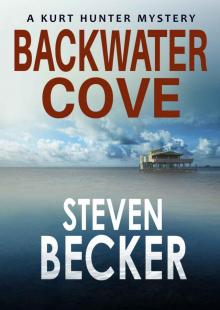 Backwater Cove
Backwater Cove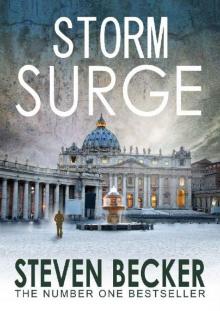 Storm Surge: A Fast Paced International Adventure Thriller (Storm Thriller Series Book 3)
Storm Surge: A Fast Paced International Adventure Thriller (Storm Thriller Series Book 3)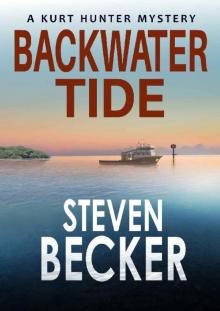 Backwater Tide
Backwater Tide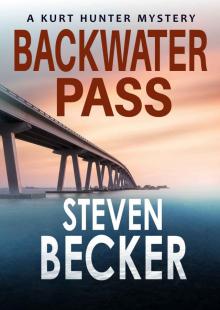 Backwater Pass
Backwater Pass Backwater Flats
Backwater Flats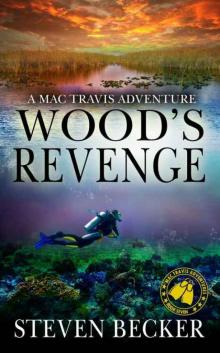 Wood's Revenge
Wood's Revenge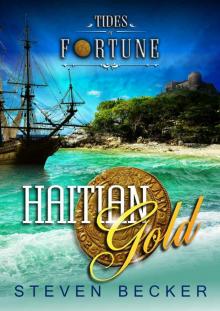 Haitian Gold
Haitian Gold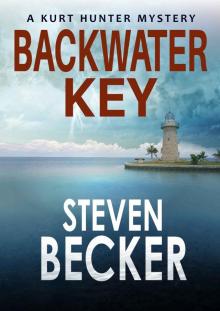 Backwater Key
Backwater Key Wood's Tempest
Wood's Tempest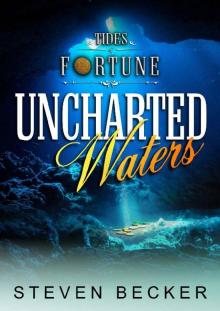 Uncharted Waters
Uncharted Waters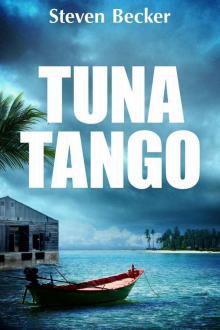 Tuna Tango
Tuna Tango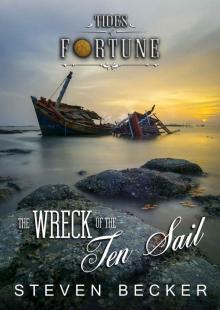 The Wreck of the Ten Sail
The Wreck of the Ten Sail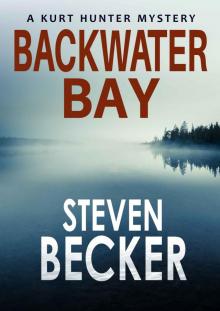 Backwater Bay (Kurt Hunter Mysteries Book 1)
Backwater Bay (Kurt Hunter Mysteries Book 1) Storm Clouds
Storm Clouds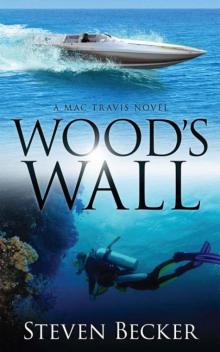 Wood's Wall
Wood's Wall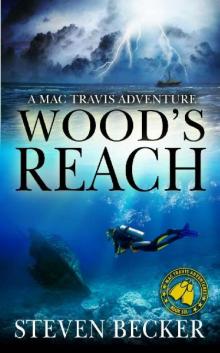 Wood's Reach
Wood's Reach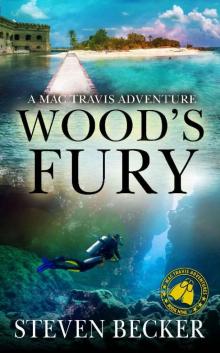 Wood's Fury
Wood's Fury Storm Rising
Storm Rising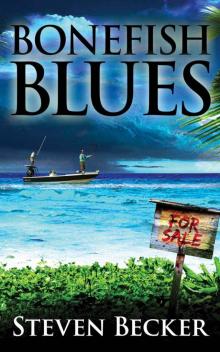 Bonefish Blues
Bonefish Blues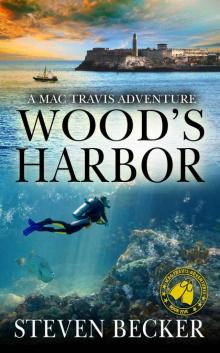 Wood's Harbor: Action & Sea Adventure in the Florida Keys (Mac Travis Adventures Book 5)
Wood's Harbor: Action & Sea Adventure in the Florida Keys (Mac Travis Adventures Book 5)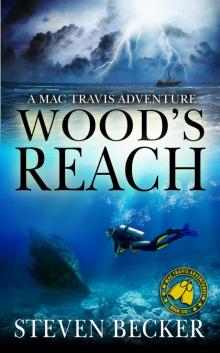 Wood's Reach: Action & Sea Adventure in the Florida Keys (Mac Travis Adventures Book 6)
Wood's Reach: Action & Sea Adventure in the Florida Keys (Mac Travis Adventures Book 6)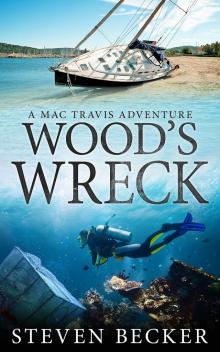 Wood's Wreck
Wood's Wreck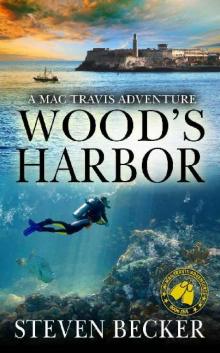 Wood's Harbor
Wood's Harbor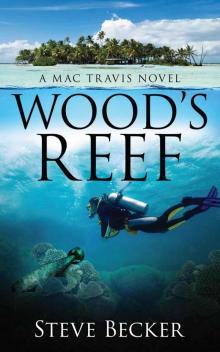 Wood's Reef
Wood's Reef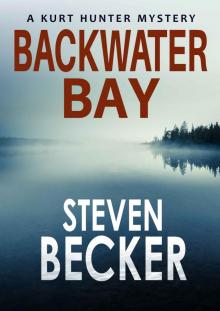 Backwater Bay
Backwater Bay